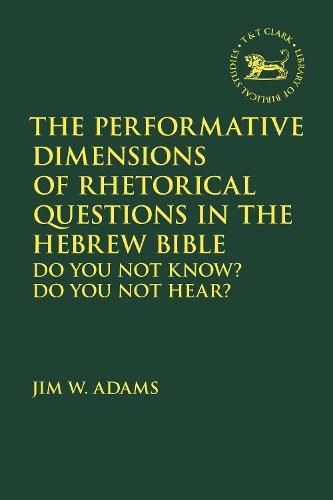Readings Newsletter
Become a Readings Member to make your shopping experience even easier.
Sign in or sign up for free!
You’re not far away from qualifying for FREE standard shipping within Australia
You’ve qualified for FREE standard shipping within Australia
The cart is loading…






This book sets out to describe the multi-dimensional nature and function of rhetorical questions in the Old Testament. Biblical scholars have previously analyzed the use of rhetorical questions in both Testaments, but consistently describe their function in persuasive terms. While this understanding is appropriate in a number of instances, many rhetorical questions do not operate this way, and Jim W. Adams focuses in particular on rhetoric expressing the self-involvement of both the speaker and hearer.
Among linguistic philosophers, speech act theory has illuminated the fact that uttering a sentence does not merely convey information; it may also involve the performing of an action. The concept of communicative action provides additional tools to the exegetical process as it points the interpreter beyond the assumption that the use of language is merely for descriptive purposes. Language can also have performative and self-involving dimensions. In relation to speech act theory, linguistic specialists continue to research the nature of rhetorical questions.
$9.00 standard shipping within Australia
FREE standard shipping within Australia for orders over $100.00
Express & International shipping calculated at checkout
This book sets out to describe the multi-dimensional nature and function of rhetorical questions in the Old Testament. Biblical scholars have previously analyzed the use of rhetorical questions in both Testaments, but consistently describe their function in persuasive terms. While this understanding is appropriate in a number of instances, many rhetorical questions do not operate this way, and Jim W. Adams focuses in particular on rhetoric expressing the self-involvement of both the speaker and hearer.
Among linguistic philosophers, speech act theory has illuminated the fact that uttering a sentence does not merely convey information; it may also involve the performing of an action. The concept of communicative action provides additional tools to the exegetical process as it points the interpreter beyond the assumption that the use of language is merely for descriptive purposes. Language can also have performative and self-involving dimensions. In relation to speech act theory, linguistic specialists continue to research the nature of rhetorical questions.